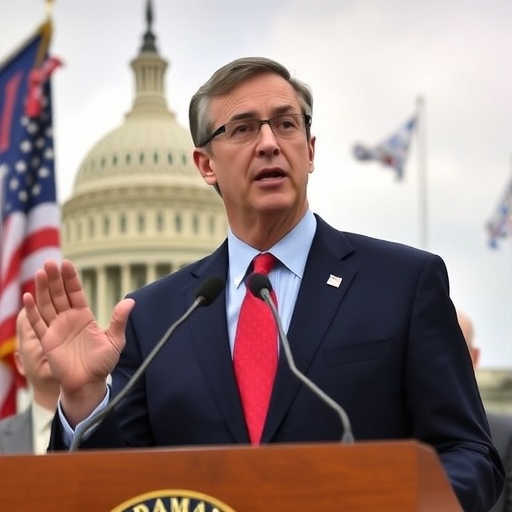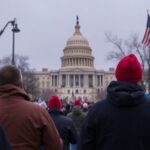U.S. Government shutdown Reaches Day 26: Treasury Secretary Scott Bessent Urges Moderate Democrats to Break Deadlock and Save Federal Paychecks
As the U.S. Government shutdown stretches into its 26th day, Treasury Secretary Scott Bessent issued a stark warning to moderate Democrats in Congress, pleading for their intervention to end the impasse that’s leaving federal employees scrambling for food assistance and threatening military paychecks. With the White House and both chambers of Congress firmly under the control of the president’s Republican party, the political stalemate has amplified calls for bipartisan compromise, but divisions remain deep over spending priorities and border security funding.
- Federal Employees Face Mounting Hardships from Government shutdown Fallout
- Scott Bessent’s Direct Plea Targets Moderate Democrats in Congress
- Military Paychecks Hang in the Balance as Shutdown Threatens National Defense
- Political Pressure Intensifies in Republican-Dominated Congress Amid Shutdown Stalemate
This prolonged crisis, the longest since the 35-day shutdown in 2018-2019, has already cost the economy billions and pushed thousands of federal workers into financial distress. Reports from food banks across the nation indicate a surge in applications from government employees, many of whom are working without pay or furloughed indefinitely. Secretary Bessent’s appeal came during a press briefing at the Treasury Department, where he emphasized the human toll: “We cannot let partisan gridlock jeopardize the livelihoods of the very people who keep our nation running.”
Federal Employees Face Mounting Hardships from Government shutdown Fallout
The government shutdown has hit federal employees hardest, with over 800,000 workers affected—either furloughed or required to work without compensation. In cities like Washington D.C. and across federal hotspots such as national parks and military bases, stories of desperation are emerging. For instance, the Capital Area Food Bank in D.C. reported a 40% increase in visits from federal workers over the past week alone, many citing unpaid bills and empty pantries as the primary reasons.
One anonymous IRS employee, speaking to reporters on condition of anonymity, shared her plight: “I’ve been working 40 hours a week processing tax returns, but my next paycheck is uncertain. My kids are asking why we can’t afford groceries like we used to.” Similar sentiments echo from the Department of Defense, where civilian staff are bracing for delayed pay that could ripple into base economies. According to a recent Government Accountability Office (GAO) report, shutdowns of this length typically lead to a 0.2% GDP dip per week, but the personal impacts are incalculable.
Statistics paint a grim picture: The National Treasury Employees Union estimates that federal employees have lost over $2 billion in wages so far, with low-income workers hit the hardest. Many are turning to credit cards, retirement savings, or side gigs to make ends meet. In rural areas, where federal jobs dominate local economies, small businesses reliant on government spending are shuttering temporarily, exacerbating the downturn.
- Key Impacts on Federal Employees: Furloughs affecting 400,000 workers; 400,000 more working unpaid.
- Food Assistance Surge: Partnerships with nonprofits like Feeding America have distributed emergency aid to 50,000+ affected families.
- Long-Term Effects: Potential for increased debt, mental health strains, and workforce attrition post-shutdown.
Experts warn that without resolution, these hardships could lead to a broader talent exodus from government service, undermining national security and public services for years to come.
Scott Bessent’s Direct Plea Targets Moderate Democrats in Congress
Treasury Secretary Scott Bessent, a Wall Street veteran appointed to steer economic policy amid turbulent times, took the unusual step of directly addressing moderate Democrats during a televised address from the Treasury’s marble halls. “To the moderate voices in the Democratic caucus, I implore you: Step forward now to end this shutdown. Your constituents—federal employees, military families, everyday Americans—deserve better than this deadlock,” Bessent stated, his tone a mix of urgency and frustration.
Bessent’s comments come as the shutdown stems from disagreements over a $1.2 trillion spending bill, with Republicans in Congress pushing for stricter immigration controls and Democrats advocating for expanded social programs. Despite the president’s party holding majorities in both the House (235-200) and Senate (52-48), internal GOP fractures have stalled progress, forcing Bessent to appeal across the aisle. Moderate Democrats, such as Rep. Josh Gottheimer from New Jersey and Sen. Joe Manchin from West Virginia—though Manchin’s term ended, his influence lingers—have historically brokered deals in past fiscal cliffs.
In a follow-up interview with CNBC, Bessent elaborated on the economic stakes: “Every day this continues, we’re borrowing more at higher interest rates, and investor confidence wanes. The shutdown isn’t just political theater; it’s eroding the foundations of our fiscal stability.” His words resonated with business leaders, who have lobbied Congress through groups like the U.S. Chamber of Commerce to prioritize resolution.
Behind the scenes, Bessent has been coordinating with White House Chief of Staff Susie Wiles to craft compromise proposals, including phased funding for border security tied to domestic aid. However, hardline Democrats remain skeptical, with House Minority Leader Hakeem Jeffries retorting, “We won’t be strong-armed into concessions that undermine working families.” This exchange highlights the delicate balancing act Bessent faces in his role.
Military Paychecks Hang in the Balance as Shutdown Threatens National Defense
One of the most alarming aspects of the government shutdown is its direct threat to military personnel, who are among the 2.1 million active-duty and reserve members potentially facing delayed pay on January 31. The Department of Defense, operating under contingency funds, has assured troops that essential missions continue unabated—from deployments in the Middle East to patrols along the southern border—but the uncertainty over pay has sparked widespread anxiety.
Defense Secretary Lloyd Austin issued a memo last week stating, “Our service members will receive their paychecks, albeit possibly late, thanks to stopgap measures.” Yet, with the shutdown entering its fourth week, those measures are wearing thin. Military families, often living paycheck to paycheck in high-cost areas near bases, are already seeking help from organizations like the Army Emergency Relief Fund, which has seen donations spike by 25% but demand outpace supply.
The ripple effects extend to defense contractors and veterans’ services. Companies like Lockheed Martin and Boeing have halted non-essential work, idling thousands of jobs and delaying projects critical to national security, such as F-35 fighter jet production. A Pentagon analysis projects that a full month without resolution could cost $500 million in lost productivity alone.
- Immediate Risks: Pay delays for 1.4 million uniformed personnel.
- Family Support Strains: Increased reliance on base food pantries and financial counseling.
- Strategic Implications: Potential morale dips affecting recruitment and retention in an era of great-power competition.
Veterans’ groups, including the American Legion, have rallied behind calls for action, urging Congress to exempt military funding from future shutdown risks. “Our heroes shouldn’t bear the brunt of Washington infighting,” said Legion National Commander Daren K. Cooper in a statement.
Political Pressure Intensifies in Republican-Dominated Congress Amid Shutdown Stalemate
With the White House, House, and Senate all under Republican control, the government shutdown represents a self-inflicted wound for the president’s party, drawing fire from both sides of the aisle. Speaker of the House Mike Johnson has defended the stance on fiscal conservatism, tweeting, “We must secure the border before unlocking the piggy bank—America’s safety comes first.” Yet, cracks are showing, with moderate Republicans like Sen. Susan Collins voicing support for Bessent’s bipartisan outreach.
In the Senate, Majority Leader John Thune faces a procedural nightmare: Any spending bill requires 60 votes to overcome a filibuster, meaning Democratic cooperation is essential. Democrats, led by Senate Minority Leader Chuck Schumer, have accused Republicans of using the shutdown as leverage for unrelated policy wins, such as rolling back environmental regulations. “This is hostage-taking, plain and simple,” Schumer declared during a floor speech.
Lobbying efforts are in overdrive. The Partnership for Public Service, representing federal employees, has mobilized grassroots campaigns targeting swing districts, while Wall Street firms warn of market volatility if the debt ceiling—looming in February—intersects with the shutdown. Polling from Gallup shows public approval for Congress at a dismal 18%, with 62% blaming both parties equally for the impasse.
Historical context underscores the urgency: The 2018-2019 shutdown, also over border funding, led to a 10% drop in federal employee morale and spurred lawsuits over back pay. This time, with inflation still pinching household budgets, the stakes feel even higher. Bipartisan talks, mediated by the Problem Solvers Caucus, are slated for tomorrow, offering a glimmer of hope.
Looking ahead, resolution could come via a short-term continuing resolution (CR) to reopen government while negotiations continue, potentially averting military pay disruptions. However, if the stalemate persists, Bessent has hinted at invoking emergency borrowing authority, though legal challenges could follow. Economists from the Brookings Institution predict that ending the shutdown promptly could mitigate a projected $11 billion economic hit, but prolonged delays might tip the nation into recession territory. As moderate Democrats weigh Bessent’s plea, the clock ticks toward irreversible damage, underscoring the need for swift, unified action in Congress to restore stability for federal employees and the military alike.








